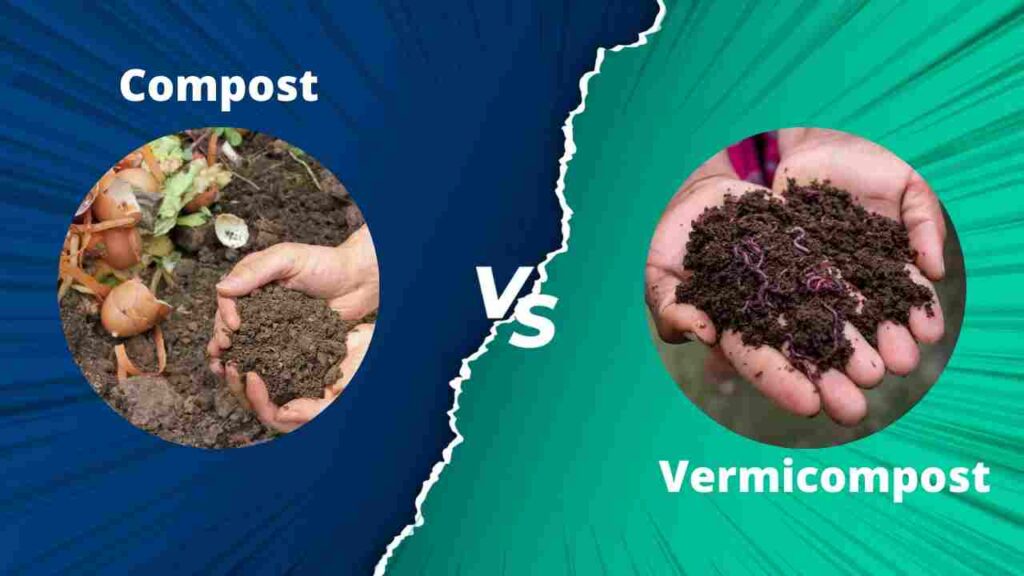
Explore 15 Difference between Compost and Vermicompost
Compost and vermicompost are both valuable organic amendments used in gardening and agriculture. While they share the goal of enriching soil fertility, they differ in various aspects. Here are 15 key difference between compost and vermicompost that everyone must know and learn before using it:
15 Difference between Compost and Vermicompost
Compost is created through the process of aerobic decomposition, which is the breakdown of organic materials by microorganisms in the presence of oxygen. On the other hand, vermicompost is made by earthworms eating organic matter and excreting castings that are rich in nutrients.
Compost is primarily broken down by bacteria, fungi, and other microorganisms that flourish in aerobic environments. Earthworms are essential to the process of decomposing organic matter and promoting the development of advantageous microbes in vermicompost.
Time Required: Depending on the materials and circumstances, composting typically takes several months to a year. Vermicomposting is typically quicker and can be finished in a few weeks to a few months because earthworms are so effective at breaking down and digesting organic material.
Nutrient Content: The nutrient profiles of compost and vermicompost are different. Vermicompost is richer in nutrients like nitrogen, phosphorus, and potassium because of the earthworms’ digestive processes, whereas compost typically has a balanced nutritional composition.
Composting decomposes a broader range of organic materials, such as kitchen scraps, yard waste, and manure. Kitchen waste, paper, and other soft organic materials are ideal for vermicomposting.
Compost piles require regular moisture, and frequently need to be watered during dry spells to keep the proper moisture level. While a moist environment is necessary for vermicomposting, it shouldn’t be overly damp because earthworm activity depends on a proper balance of moisture.
Pests and Odour: Poorly managed compost piles can produce unpleasant odours and draw rodents and flies. When done correctly, vermicomposting produces little smell and has fewer pest problems.
Temperature: As organic matter decomposes in compost piles, heat is produced, and temperatures can rise significantly. Vermicomposting takes place at lower temperatures, typically in the earthworms’ preferred range of 55–77°F (13–25°C).
Compost typically has a crumbly texture, visible plant material, and decomposed organic matter. Vermicompost resembles coffee grounds in appearance and texture, being finer and more uniform.
Compost and vermicompost both help to improve soil structure by increasing the soil’s capacity to retain moisture, enhancing aeration, and fostering advantageous microbial activity. Vermicompost, on the other hand, can offer better soil aggregation and porosity due to its finer texture.
Seed Germination and Plant Growth: Due to the presence of beneficial microorganisms, seeds planted directly in compost may experience a stronger initial growth. Vermicompost encourages robust seed germination, healthier plant growth, and higher yields because of its higher nutrient content.
pH of the soil: Compost typically has a neutral or slightly acidic pH, which is advantageous for a variety of plants. Due to the earthworms’ digestive processes, vermicompost has a slightly higher pH, making it suitable for crops that prefer a slightly alkaline soil environment.
Compost can be made on-site using a variety of organic materials, including plant debris, kitchen scraps, and yard waste. Vermicomposting is less common and occasionally more expensive to produce because it needs specific earthworms and feeding materials.
Versatility of Use: Compost is frequently used for mulching, potting soil mixtures, and general soil conditioning. The higher nutrient content of vermicompost makes it especially useful as a top dressing for plants, in seed-starting mixtures, and for boosting soil fertility in farms and gardens.
Environmental Impact: Composting and vermicomposting both help to cut down on waste dumped in landfills and greenhouse gas emissions. Vermicomposting can be seen as being more environmentally friendly because of its smaller carbon footprint and quicker processing time.
Understanding the differences between compost and vermicompost allows gardeners and farmers to choose the most suitable amendment for their specific needs. Whether it’s the nutrient content, production time, or preferred application, both compost and vermicompost provide valuable contributions to sustainable agriculture and soil health.
Also Read: Understand the Time difference between India and Thailand